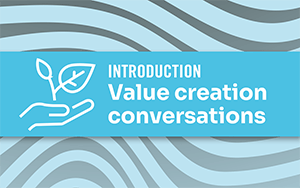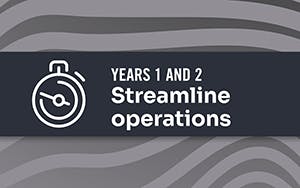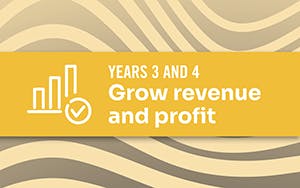
Multimedia | Stage 2 of the private equity transaction life cycle
First 100 days: Build strong foundation
Value Creation Conversations
In this video, Principal Jen Finger shares key points of the second stage of the life cycle: Build strong foundation.
Key topics discussed:
- Overview of post-acquisition processes
- Role of the CFO advisory team throughout the process
- Analysis of a typical acquisition scenario
- Setting-up companies for success
- Additional value provided by the CFO advisory team
Watch the video now for a deep dive into those crucial first 100 days.
All Value Creation Conversations videos
Contact the CFO Advisory team
Jennifer Finger: Hi, I'm Jennifer Finger. I lead CFO Advisory Services out of Chicago, serving the Midwest.
Interviewer: Today we're talking about stage two of the private equity life cycle, building a strong foundation during the first 100 days. So, following an acquisition, what happens first? Or what should happen first?
Jennifer Finger: First, the company will want to assess a few things. The finance team, the structure, also the IT systems, as well as the HR system. So, if the right people are in place. And then also the processes, so if the financial reporting system is proper, as well as the right structure for controls, if there's a good monthly close process. All of the processes in place, as well as the people.
Interviewer: As part of the assessment, are you giving recommendations and then implementing those recommendations?
Jennifer Finger: Yes. So, oftentimes, we will do an assessment and then present our recommendations, and the management or the private equity fund will then determine that the finance team is too thin to implement them on their own. So, we will go through a process of then assisting them with the implementation, and we might be there for a short amount of time, just implementing some of the recommendations, or we'll be there for a longer period of time.
Interviewer: Does one of those happen more often than the other?
Jennifer Finger: Traditionally, we'll start along a short process, and then, oftentimes, we're there for an extended period of time. So, our engagement letters typically start for a short process, and oftentimes, we're there for six months, 12 months, 18 months most recently, just helping onboard new financial teams, from CFOs to controllers to anything in between.
Interviewer: What are the key things that happen right after acquisition?
Jennifer Finger: So, the biggest pieces to look at, obviously, as we talked about before, would be the structure of the finance team as well as the internal controls, the monthly reporting structure, and I think those are the things that need to happen immediately to make sure that the reporting is in place, so that you can understand where the company sits and where they need to go.
So, right away we're in there, helping with the monthly close process, helping implement KPIs, helping implement management reporting structure to the new owners, which is usually much more voluminous than it was before. And then, oftentimes, we're also helping assess the finance team and then making recommendations on what needs to change, usually beefing up that finance team, and then helping onboard a new finance team. And those things usually need to happen within the first 100 days, at least the assessments and then quickly onboard the new reporting structure and then new people so that they have the best structure in place to grow and get that return on investment that they're looking for.
Interviewer: How receptive are employees to having Baker Tilly come in? How do they feel about having another advisor in the mix?
Jennifer Finger: It depends on the transaction, depends on the structure of the finance team in place and where they need to go from there. But, at the end of the day, we become a partner to both the finance team as well as the private equity fund. So, either way, we work to build that relationship from day one to make them understand that we're there to help add value, to make them look good, and to really help make their jobs easier. So whether that be a week down the road, a month down the road, they end up really liking us and being appreciative of why we're there.
Now that may not be on day one. They might be resistant to us being there, having another advisor there, because they've just been through a long period of due diligence for people asking them for things. And on day one, we are asking them for things. "What are your books and records looking like? What does the control structure look like?" And so, we are asking them for things so we can understand what their situation is. But, because we become a partner and, at the end of the day, we make their jobs easier, they end up really liking us and being thankful that we're there.
Interviewer: Is it ever defensive in the beginning?
Jennifer Finger: Yes, extremely. Not always. Sometimes they're afraid we're going to take their jobs, which sometimes ends up happening, depending on their skillset, but we try and make the partnership as productive as possible and to help them in every way that we can, and make that partnership really productive.
Interviewer: Knowing the issues that arise during this stage, what additional value can Baker Till and your team have?
Jennifer Finger: So, the first thing being that we always become partners to our clients, but I would say a bigger thing is that, because we are part of actual Baker Tilly, the assurance firm and consulting firm, we have so many other resources. So, we're CFO Advisory, we have a variety of different types of people. We have P&A, we have the audit backgrounds, we have IT people.
But, because we're Baker Tilly and we have those other teams we can pull from, we can really solve any problem that a client has. So, if they're very IT-focused, we have a client that we're helping them implement Power BI dashboards for their whole organization, we can rely on our Digital Solutions team to do that. Or we can partner with other teams for SAPs and implementation. Basically, any problem that a client has, we can pull from other resources within our larger, broader firm to do that with. So, it's a really great partnership for clients to help solve their problems.
Interviewer: It sounds like a very holistic approach.
Thank you for watching. Count on Baker Tilly to help guide you through any step of the transactional life cycle process.




